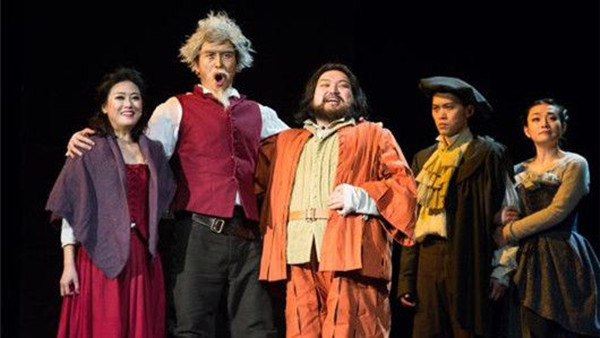
The original story is Spanish, the first musical adaptation was in English, but now "Man of La Mancha" has come to the Chinese stage and in the Chinese language. It's testament to the universal themes of Miguel de Cervantes' tale, "Don Quixote".
It's a story about hope, about the courage to follow one's dreams and even, to quote the musical's famous line, "To dream the impossible dream".
The music is Spanish. The costumes are Spanish. Even the names of the characters are Spanish. But the actors on stage are all Chinese, and so are the words coming out of their mouths.
It's the Chinese-language production of Dale Wasserman's 50-year-old Broadway musical, "Man of La Mancha", about the imaginary adventures of the mad knight, Don Quixote.
For director, actor, and monologist Joseph Graves, the biggest challenge of mounting this show was a linguistic one.
"Knowing both languages, you can imagine the difficulty of trying to keep the rhyme, keep the meaning, and in a play like 'Man of La Mancha', which uses this heightened, almost faux Shakespearean language for Don Quixote to speak when he goes kind of crazy, you're trying to keep all of those elements and find a Chinese counterpart to that, and it's very difficult," said Joseph Graves, director.
The story structure for "Man of La Mancha" is a "play within a play".
It's the late 16th century, and the author Miguel de Cervantes is thrown into a dungeon, with his manservant Sancho, as he awaits a hearing with the Spanish Inquisition.
He has brought along all his possessions, including a valued manuscript that the other prisoners want to burn. So they set up a mock trial, and Cervantes puts on a play in his defense.
He gets into costume to become the old man Alhonso Quijana - he who has lost his mind and believes he should become Don Quixote De La Mancha.
So what is La Mancha?
"Well, La Mancha is a mysterious place, a place of ideas and dreams and hope. So anyone who would classify themselves as a man of La Mancha is one who is brave enough to follow his dreams and have hope," said Joseph Graves.
Therein lies the universality of this story, according to Graves, and its call to the human soul. It's why 'Man of La Mancha' has been revived four times on Broadway and adapted and produced in 16 languages.
But this is only the second time the musical has been translated and performed in Mandarin Chinese. The first time Seven Ages Productions presented this Chinese version of "Man of La Mancha" was only last year in Shanghai, where it ran for 22 performances.
So how does a director who doesn't speak Chinese, direct an all-Chinese cast? Most of whom speak no English?
"Uh, uh, uh, uh, eh! After a week of trying to work with a translator, I just said no, and we started working together as actors, and I would do monologues for them, and they would do scenes for me, and we began to develop this sort of non-verbal way of communicating," said Joseph Graves.
But Graves didn't have any issues communicating with Liu Yang, who plays the lead role of Cervantes and Don Quixote. Liu even gave us a sample of "Man of La Mancha"'s iconic song in both English and Chinese.
"To dream the impossible dream, to fight the unbeatable foe. What's the Chinese version ? That's a challenge. To dream, the impossible dream, to fight the unbeatable foe, to bear with unbearable sorrow, to run where the brave dare not go!" said Liu Yang, lead actor of Cervantes/Don Quixote.
The central theme of people's dreams, whether possible or not, is what makes "Man of La Mancha" a story of timeless appeal.
"After like 50 years, in China, it's like the opposite side of the world, and people still can feel it and be moved about it. And so many people cry - we can hear people crying on stage when we're doing the scenes. It's very strong scenes and strong words," said Liu Yang.
The female lead character is a serving wench and prostitute called Aldonza, played by actress Miao Fang. She says this has been one of the most challenging roles in her career.
"Not just out of all the Western musicals and plays, but Chinese or foreign ones as well, this character is a rather complicated one. She's very hard to play. She's very different than who I am, and she existed so long ago," said Miao Fang, lead actress of Aldonza.
"So at first it was very hard to grasp her character, but now Aldonza pretty much knows who I am, and I know who she is as well."
Miao adds that, though all the actors are Chinese, it's important not to let the audience feel that they are watching Chinese characters, because the musical is set in Spain.
Inspired by one the most enduring characters in literature, "Man of La Mancha" first hit Broadway in 1965 and took home five Tony Awards.
So it's no surprise that as the musical-theatre industry in China is taking off, "Man of La Mancha" is now being produced in Chinese to reach an even greater audience - one that might also be inspired by the madness and hope of Don Quixote.


















































